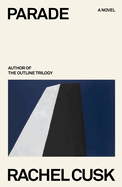
Friendly warning for anyone hoping to go unnoticed through life: it's harder than one might think. That's especially true for anyone planning a family and a career in the arts, a combination that can make anonymity impossible. Rachel Cusk (Transit; Kudos; Second Place) explores this tension and others in Parade, four integrated pieces about a panoply of artists, all of them referred to as G. The G of "The Stuntman" has begun painting his subjects upside down in response to criticism from early in his career. Cusk juxtaposes this story with that of a woman who is attacked on the street and later immerses herself in art by other Gs, including a Black artist's tiny paintings, "a comment on marginality."
Marginality is one of many recurring themes in these exceptional pieces, from artists of color who feel unseen to women subjugated by men. In "The Midwife," G "had run away from her parents and her own country" to take control of her life and career, only to marry an abusive photographer. "The Diver" presents art world administrators discussing the struggle to separate from the dominion of oppressors, a conversation that occurs after a suicide at a museum. "The Spy" focuses on yet another G, a filmmaker whose guiding principle is to evade responsibility and recognition, even using an alias so that his mother wouldn't know the films were his. Cusk returns often to themes of freedom, relations between parents and children, and the question of whether conventionality hinders or stimulates creativity in this marvelous work. --Michael Magras, freelance book reviewer

